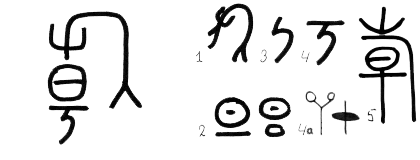I Ching, Yijing or Zhou Yi
"Oracle of the moon": © 2000 LiSe
 Yi Jing, Oracle of the Moon
Yi Jing, Oracle of the Moon

Qián, hexagram 1
The laws (or the Power of Direction)
Hex.1 is an image of waving banners in the first morning light. The banners are the sign of the leader, the one who is at the head of the state or of the army. He gives the orders, organizes everything and makes sure everybody is in the right place and knows what to do. It is also the force behind nature and living creatures. Without this organization, nature would become a mess and creatures would disintegrate. This power causes all processes in nature, or in our body, to work as a whole and all in the same direction. This is why life is called 'organic' matter: organized. Photons, tiny units of light, are the messengers which cause this organization! (See the work of Popp and Puthoff).
The banner in the center of the city, camp or army shows the direction of the wind, but also the location of the leader.
The Big Dipper in Heaven shows the direction of the seasons, the location or "times" of the sun. Both are beakens of organization. Heaven is the hexagram of time and direction, of the laws in everything. Hexagram 1 gives direction, but cannot 'make' anything on its own. All lines changing seems like a lot of action, but it goes all to heaven, not to anything tangible.
The visible manifestation in heaven of this power is the sun. The leader of life on earth. The sun sets the time, rises and wakes up all creatures, goes down and makes the time for resting. The big dipper is Heaven's clockhand, it points to the east in spring, south in summer, west in autumn and north in winter. Its spokesman is the dragon.
Timing means one joins forces with this power and follows its directions. So if you get this hexagram, examine if it is the right time for your plans - or if they are the right plans for this time.

Qián: the character is composed of 1, yan3 : banners. 2, dan4 : dawn, the sun just above the horizon. 3, yi3 : vapors or breath. Maybe the line of the sun-at-dawn belongs to 4: obstructed vapors or breath, but this is not very probable. No yi3 in the older version at right. The pole with banners was erected in the center of settlement or army: the place of the leader.
Another possibility: 丂 (in the image 4) also means 'exclamation’. At dawn the sun shines on the banners, and a loud sound is played or shouted to wake up the camp or the city.
QIAN2: to create, creative power, life-energy, strong, lasting, continuous, constant; heaven, father, male, sovereign; active transforming power, élan, fundamental dynamism, the undivided One. Spirit and time. (Pronounced gan: dry, dried, clean, useless, forceless).
In the Mawangdui Yijing hex. 1 is JIAN ‘the key’: the male organ.
See Harmen's article "The banner of Qian"
The trigrams: Heaven above Heaven.
Heaven moves: firmness.
A noble one owing to his own strength never ceases.
More about hexagrams 1 and 2 HERE